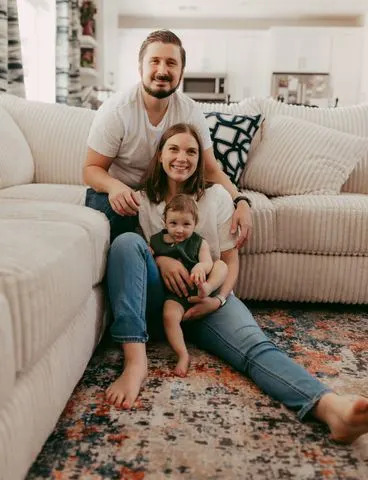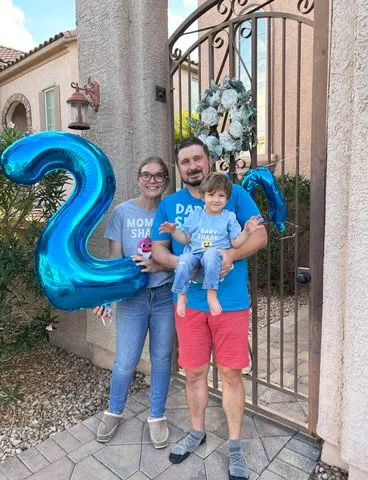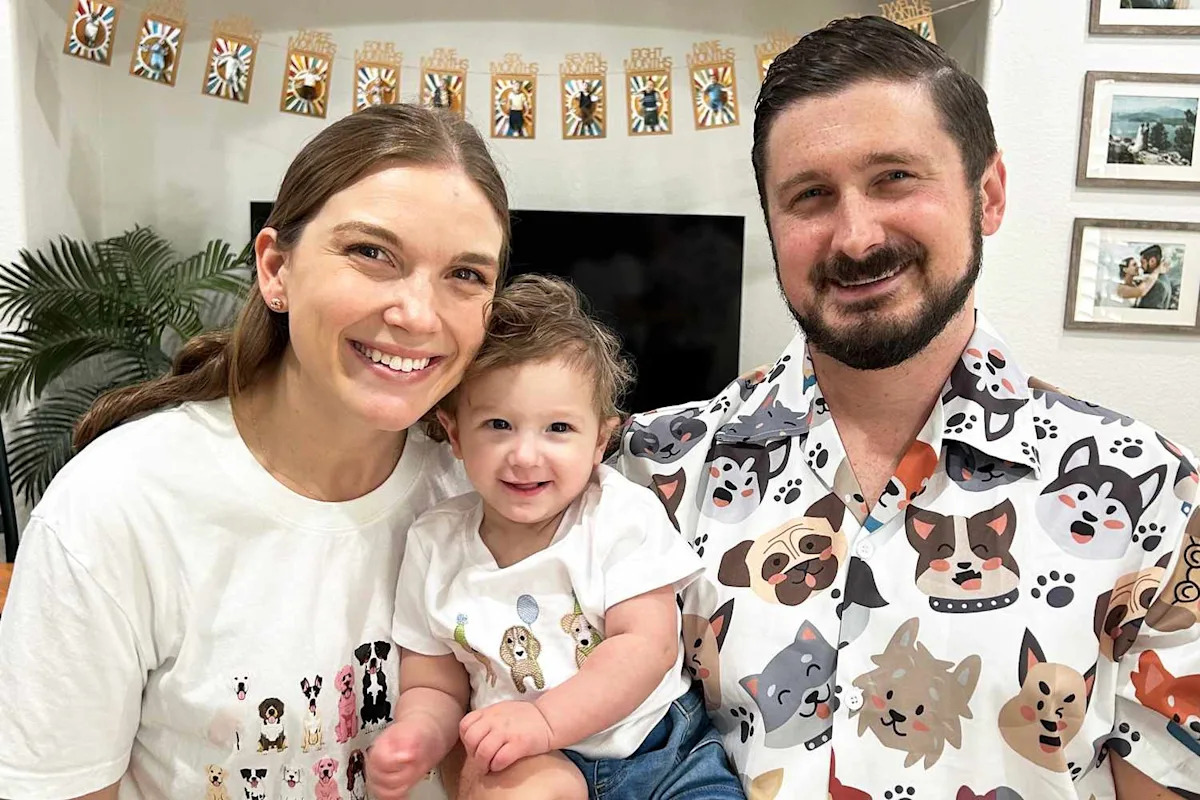NEED TO KNOW
Klairissa and Mike welcomed their first baby after some pregnancy complications, but were excited to bring their baby boy home
Over time, different delays and tendencies led the couple to explore possible medical reasons for Calvin’s rate of growth and development
In getting a KARS diagnosis, Calvin became one of fewer than 50 people worldwide with the condition
A family of three’s vision of the future may have shifted, but there are still bright days ahead.
Klairissa and her husband, Mike, had been married for two and a half years before conceiving their first child. The couple was excited to start their family.
“My pregnancy was fairly normal when it started. He’s our first baby, and we were really excited and looking forward to having him. He’s the first boy in our family — I have four nieces on my side and he’s the first grandchild on my husband’s side.”
Complications began to arise around 28 weeks into Klairissa’s pregnancy, leading to her being put on bed rest.
“At 30 weeks, they were telling us he was measuring really small, like he had just stopped growing. They didn’t know why. At 32 weeks, I was hospitalized, and he was born at 35 weeks,” she shares.
Never miss a story — sign up for PEOPLE’s free daily newsletter to stay up-to-date on the best of what PEOPLE has to offer, from celebrity news to compelling human interest stories.
When the couple welcomed Calvin, there still wasn’t a clear idea of what was happening with him medically.
“They were saying, ‘He’s just small. Maybe it was your placenta. He’ll grow better when he gets out.’ We were expecting a pretty normal postpartum experience, but instead, he spent two weeks in the NICU,” Klairissa explains. “We were then discharged home, and about two weeks later, he was re-hospitalized for about a week. Then two months later, he had another hospitalization. And that’s kind of when everyone started getting really worried.”
As doctors took a deeper dive into what Calvin was experiencing, the family was transferred to their nearest children’s hospital, which was four hours away from home.
“They started doing a full workup, and they had all these specialists come in,” she recalls.
“They’d tell us, ‘he has nystagmus, so his eyes weren’t moving the right way,’ and ‘He has microcephaly, so his head’s really small and he looks dysmorphic — his features don’t look like we would expect.’ Then, all of a sudden, we’re like meeting with neurology and cardiology and genetics and ophthalmology, all these specialties,” she recalls. “It was just such a shock because we thought he was perfect, obviously.”
Testing led to more testing and appointments, without any concrete answers. In the meantime, Klairissa and Mike were seeing developmental delays in Calvin. Their first round of genetic testing found no abnormalities, which gave them hope that things would ultimately be okay.
Eventually, Calvin underwent whole genome sequencing, which led to him finally getting a diagnosis. “Calvin was diagnosed in May of this year, at around 20 months, after testing that started when he was 2 months old. That’s how long it took us to get our formal diagnosis.”
Calvin was diagnosed with KARS syndrome. Per the Cure KARS – Laia Foundation, KARS syndromes are ultra-rare diseases caused by a mutation in the KARS1 gene, which prevents cells from producing enough energy, affecting the nervous system and major organs such as the brain, eyes, liver and ears.
Klairissa and Mike found it “very much a shock” to learn that their son was living with this genetic condition.
“No one else in our families has any kind of developmental disabilities or delays, so it’s all been a big learning curve for all of us,” she shares.
Mike worked as a nurse in pediatrics for several years, while Klairissa worked in speech therapy. Neither of their backgrounds could have prepared them for what they faced, but it did help inform their decisions along the way.
“My husband is really the calm in the chaos. His support began immediately, from the time Calvin was in the NICU. He was really reassuring and kind of explaining things in a way he knew would make sense to me. He was reminding me that Calvin is our son and he’s absolutely the light of our life and we love everything about him, no matter what.”
Calvin, now 2, lives with many of the typical symptoms of KARS, Klairissa explains. “He has microcephaly, so a small head, which has led to seizures. He has multiple seizures a day. They are hopefully controlled now with medication, but they are absent seizures. Because he had multiple a day, it’s made it difficult for him to focus and engage with us. He has mystagmus, so his eyes are constantly moving. He has a really hard time focusing on similar objects, which has led to delayed motor skills,” she explains.
“He can only crawl, and so that really impacts his ability to get around and participate with other kids his age. We are in the process of working to get him to mobility devices, but it’s just a slow process with insurance and stuff. He has feeding difficulties. It’s a constant struggle to ensure we have enough of his special formula to take with him when we go out or to daycare.”
She continues, “His KARS also causes poor energy, so he needs to nap frequently. He typically still sleeps two to three hours during the day on his best days because he is exhausted and his body cannot produce enough energy to keep up with him. Everything that a normal toddler should be doing, he has to work twice as hard to do because he doesn’t have the energy to do it. He doesn’t have the coordination because he can’t practice those skills when he’s constantly having seizures or when his body’s so exhausted.”
What they weren’t prepared for was that there would be so little information about what the path for children with KARS looked like.
“If you turn around and Google it, there’s hardly anything on it, just because there are so few cases,” Klairissa says. “At first, I think we were both just really in shock, but slowly we’ve just come to understand. For us, it’s important that we remind each other that it’s not going to be like we pictured it, and Calvin’s life isn’t going to be exactly how we imagined, but it doesn’t mean that his life isn’t equally as bright and full of love. Calvin is very unique, and he’s ours, and we just love everything about him.”
While milestones are also different than what she’d imagined, Klairissa and Mike have learned to embrace and celebrate all the milestones Calvin gets to enjoy.
“The good days are really good, and I think that’s what reminds us that it’s all going to be okay. We just remind each other of those really good things that he can do and the really positive to get through those harder days.”
Calvin gets to enjoy life as other toddlers do, in many respects. His days are split between daycare, therapy and quality time at home.
“Having a diagnosis gave us some reassurance because before we were like, ‘What is Calvin gonna do if he doesn’t eat solids? Is he going to need a G-tube? Is Calvin gonna walk? Is he going to be able to go to school? Is he going to be able to learn things?’ Having a diagnosis helped us answer some of those questions and get some ideas. I do feel like we’re more confident and understand more about why we’re seeing what we see.”
But to help Calvin progress, the parents have to juggle a variety of doctors’ appointments, seeing some specialists weekly.
“We do physical, speech and feeding therapy every week. We both work full-time. We do occupational therapy two times a month. We do have an early intervention specialist come and work with him two times a month. He has all of those therapies, and then we are pretty much at a doctor’s office every week with all the different kinds of specialists.”
This requires a lot of logistical coordination between Klairissa and Mike, who both work full-time. It’s a new normal they’ve accepted, and in part, they accept there is no such thing as a normal.
“There hasn’t been a lot of direction, but unfortunately, with rare diseases, there’s just so little research. Currently, there are no treatment options available. And I think you know a lot of families that have children with rare diseases feel the same way we do — there’s no guidance and limited support. There are a couple of really big hospitals that are conducting research, but not on ultra-rare diseases like KARS. Other than that, there’s not a whole lot that we can do right now,” the frustrated mom shares.
In looking for community, Klairissa started joining Facebook groups to connect to the few other families impacted by KARS, as well as the wider community of caregivers for those with rare illnesses. It’s how she became aware of the Cure KARS – Laia Foundation, which is currently raising money for gene replacement research for those with KARS.
“[These other caregivers] were in the same situation as we were, and they asked, ‘What more can we do?’ So they made this foundation. When Mike and I connected with them, we really wanted to know what we could do to support that research. We realized the best way to do that was to put Calvin’s story out there,” the mom shares.

Kate Todd Photography
Mike, Klairissa and Calvin
Sharing their story on social media didn’t come naturally to the couple at first, but as they discussed it, they saw the value.
“When we started an Instagram for him, my husband was a little bit more reserved about it. He was worried about what it meant for Calvin, but we talked about it. We know that Calvin is not something to hide. This is who he is and what he has and what we’re doing. We didn’t get a choice, but we’re going to make the best of this and support Calvin in whatever way he needs,” Klairissa explains.
“Because honestly, we didn’t really tell people about his genetic diagnosis. We kind of just kept it to ourselves and would leave it as, ‘Oh, you know, he’s delayed,’ but we never explained why. As soon as we put that story out, we got so many calls, texts and messages from friends who didn’t know and wanted to share their love and support and desire to help. So much support came from that, and it really validated our decision. It made us realize we have a bigger community around us than we knew before. “
Mike and Klairissa have started offering a t-shirt that celebrates Calvin and supports Cure KARS’ efforts. They say it’s one step toward helping a community that has embraced the family.
“Before Calvin was diagnosed, I didn’t quite understand how families with genetic diagnoses or even rare diseases got by. I think the biggest takeaway for me is that I want anyone who is in the same position to know that although there’s limited research and awareness, that doesn’t mean that people don’t want to support you and there isn’t hope,” she says.

Kate Todd Photography
Klairissa and Mike celebrate Calvin’s 2nd birthday
“We want to get this research rolling on gene replacement for these kids with KARS. In the meantime, we continue our therapies. Physical therapy, specifically, has been the biggest support for Calvin just because he had really low tone and poor coordination. The low energy really impacted his motor development,” she continues. “When we started therapy, he wasn’t even sitting up on his own yet. He didn’t until around 9 months. All these delays were happening, but our therapy team was constantly there and reminding us of the benefit of working with him, and sure enough, he gets there.”
Klairissa appreciates that the therapy team has “just really been the biggest cheerleaders for Calvin.” They make it a little easier for Calvin to be his best self, “a giggly, happy toddler.”
“He loves anything that lights up, like the flashlight on the phone. He loves music, absolutely lights up anytime he hears it. ‘Baby Shark’ is a personal favorite. He loves cars, looking at them and pushing them around. He really, really loves books too. He loves to turn the pages, read books and listen to books. He enjoys a lot of regular toddler things, but in his own way.”
Read the original article on People

